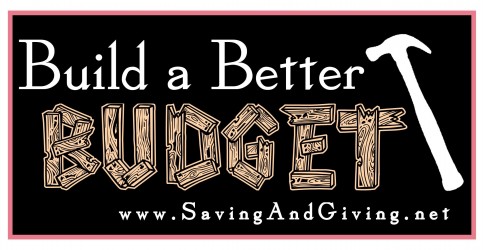We’ve been talking about budgets for a while now. So far in our Build a Better Budget series, we’ve talked a little bit about why we even bother creating a budget, about how the budget is more of a seat belt than a shackle, about the budget being a great communication tool, about the nuts & bolts of budgeting, about using cash envelopes, and about planning for the unexpected. Last week, we even talked about what to do when you blow it. I hope that our conversations have gotten you thinking about the possibility of creating your family budget. Be sure to sign up for my free email updates or for my RSS feed so that you don’t miss out on any of the conversation.

It seems like we’ve been talking about budgeting for quite a while! Hopefully you’ve been inspired to start (or continue!) budgeting your money. The biggest roadblock that we seem to run into is that our income fluctuates. And it doesn’t fluctuate a little.
My day job is the base salary for us. We know that it’s the one we can count on to stay the same from week to week. But we have FIVE other streams of income that are not reliable. Well, they’re reliable in that they do produce income. But we never have any idea how much income will come from any given one of them. We definitely have a variable income.
So how in the world are we supposed to budget when we’re never sure how much money will appear next month? I’ll share our plan, and then maybe some of you other variable income-earners can chime in with things that have worked for you.
First, let me share with you what DIDN’T work for us. What didn’t work was not paying attention. We used to just look at the checkbook balance to determine whether or not we had enough money to make a purchase. If the balance was healthy-looking, then we went for it! We didn’t take into account that next month’s income would be thousands less. We would deal with that then.
We now do a two-part budget. Our first step is to budget the base salary that is dependable. We use this money to cover all of our basic living expenses, debt payments, and few other items. Once we’ve spent that money on paper, we make a list of other things we’d like to spend money on. These are items like specific home remodeling projects, clothing/shoes (above and beyond the regular budget), trips, extra debt payments, etc. We keep an ongoing list and evaluate it each month. Then, we prioritize this list. We decide what’s most important to us, and we put it at the top. We work our way through the list until each item is assigned a priority level. When we have extra income, we go straight down the list.
Here’s a real example from this month. We had extra income. We looked at our list. The next item waiting to be funded is undercoating our truck. Guess what’s going to happen within the next week or two. You got it…. Our truck will get undercoated. Once we pay for that, we can see if we have enough left for the next item on the list.
So far, this seems to be working for us. The only down-side is that new items keep sneaking their way onto the list, and we keep wanting to rearrange it. The beauty of doing a new budget each and every month though is that we can rearrange this list. Each month we can take a look at it and decide what our current top priorities are. It’s OUR budget, and it’s OUR priority list. That means that WE have complete control over it!
What about you? Do you have a variable income? If you do, how do you handle the ups and downs when you budget?
This post is linked to:
:: Frugal Friday hosted by Life As MOM
:: Works for Me Wednesday hosted by We Are THAT Family

My husband is paid hourly, and also in the construction field. He works in a shop now, but when he was out in the field a couple of rainy days would take a huge bite of our check! Then we might have a hot project week where he got 30 hours of OVERTIME and a fat check.
I wrote about budgeting a bit here:
http://www.milehimama.com/2010/05/11/savings-and-spending-wfmw/
Basically, we set our budget at below our “usual” take home. We deposit the check into savings and transfer our weekly allotment over. A very short week, we might transfer more than the paycheck, making up for the shortfall with our savings (that’s what they are for!)
Great idea! Sounds like you have a solid plan for navigating those peaks and valleys!